The French Council of State rejected an appeal censor a very controversial painting by Swiss artist Miriam Cahn depicting sexual war crimes committed in Bucha, Ukraine. The work is currently on view in the artist’s retrospective titled “Ma Pensée Serielle” (“My Serial Thought”) at the Palais de Tokyo in Paris.
In today’s written verdict, seen by Artnet News, a judge found that Cahn’s painting, titled fucking abstraction!, can remain suspended, because “the only intention of the artist is to denounce a crime” via the work. The painting also does not ‘violate’ children’s safety or human dignity, as the appellants argued, since additional steps were taken to contextualize the ‘extraordinarily raw quality’ of the work, Council said. , which acts as the supreme court of appeal before the administrative courts. The Palais de Tokyo does not allow unaccompanied minors in the side gallery displaying the contested work and advises against showing it to children.
The semi-abstract Cahn painting in question depicts forced fellatio, based on the rape and massacre of Bucha residents by Russian troops, and was intended to expose sex crimes being used as a weapon of war, according to the artist. The petitioners, however, said the central victim in the scene appears to be a child due to his small size. They argued that this was enough to justify removing or restricting the work to minors on the grounds that it violated French law prohibiting the public display of “child pornography” material that “incites” predators and “puts minors at risk”.

Myriam Cahn, fucking abstraction! (2007-2022). 3009 CAH/P 3029. Courtesy of the artist, Galerie Jocelyn Wolff and Meyer Riegger Berlin/Karlsruhe. Photo by Francois Doury.
Today’s ruling is the second legal ruling on the issue, following weeks of controversy fueled by figures from France’s far-right, which has spilled over into all political camps. In March, the debate first went to court when several associations filed an unsuccessful legal petition to censor the painting. Undeterred, four of the groups appealed the decision, led by the Association Juristes Pour l’Enfance (JPE), which is linked to the anti-same-sex marriage protest movement La Manif pour tous.
In response to today’s verdict, Paul Mathonnet, lawyer for the Palais de Tokyo, told Artnet News: “It is very important that the judge has put a clear end to attempts to circumvent the right to freedom of expression. , through so-called protection… This shows that you cannot remove a work of art from its context.
Cahn reiterated that she did not depict any children in the painting, and the contrasting size of the subjects is a metaphor for showing “the bodily power of the oppressor and the fragility of the oppressed”. This statement is shown next to the painting, which is one of more than 200 on display through May 14 at the retrospective curated by Emma Lavigne and Marta Dziewanska.
Nevertheless, the clarifications did little to appease critics who launched a petition against the work, signed by nearly 14,000 people. The issue escalated further when far-right MP Caroline Parmentier brought it to the National Assembly in a plea for its removal.
Speaking to the left-leaning daily Release ahead of today’s ruling, Cahn, who has long faced controversy over his works, called the current debate “absurd” and lamented that “for a long time I could show nothing to the States United, but I didn’t’ I don’t expect that in Paris.
Indeed, lawyers for the art center claim that local extremists have been influenced by ideologies “blown from across the Atlantic”, exemplified by the recent outcry in Florida on Michelangelo David. “There is a cultural and political battle being waged” by some of the plaintiffs, added Mathonnet.
In its reaction today, the Palais de Tokyo also indicated that it “regrets that the case has led to the exploitation of this work”.
However, JPE lawyer Adeline le Gouvello told Artnet News that “the whole argument of the opposition was to say that the issue was political, to prevent us from getting to the root of the problem”. She added that the judge’s decision was “completely inconsistent” in acknowledging that “there is a problem with this work”, requiring “unprecedented precautionary measures”, while allowing children to see it.
Calls to censor Labor are not limited to partisan lines. Homayra Sellier, founder of children’s advocacy group Innocence in Danger, which joined the JPE in its legal petition, told Artnet News that the group was not linked to any political movement. “We don’t care that Miriam Cahn claims that she exposes war crimes. It doesn’t matter,” she added. “The first impression this painting gives… is that they are children.”
Supporters of the exhibition also came forward. In an April 8 The world editorial, 26 leaders of French artistic institutions defended the freedom of artistic expression and denounced a so-called international “cultural battle”. Among the signatories were Laurent Le Bon, president of the Center Pompidou; Chris Dercon, President of the Réunion des Musées Nationaux – Grand Palais; and Jack Lang, former Minister of Culture and President of the Arab World Institute. “Rather than being afraid to shock,” the editorial reads, “we should be afraid never to shock [anyone].”
Follow Artnet News on Facebook:
Want to stay one step ahead of the art world? Subscribe to our newsletter to receive breaking news, revealing interviews and incisive reviews that move the conversation forward.
